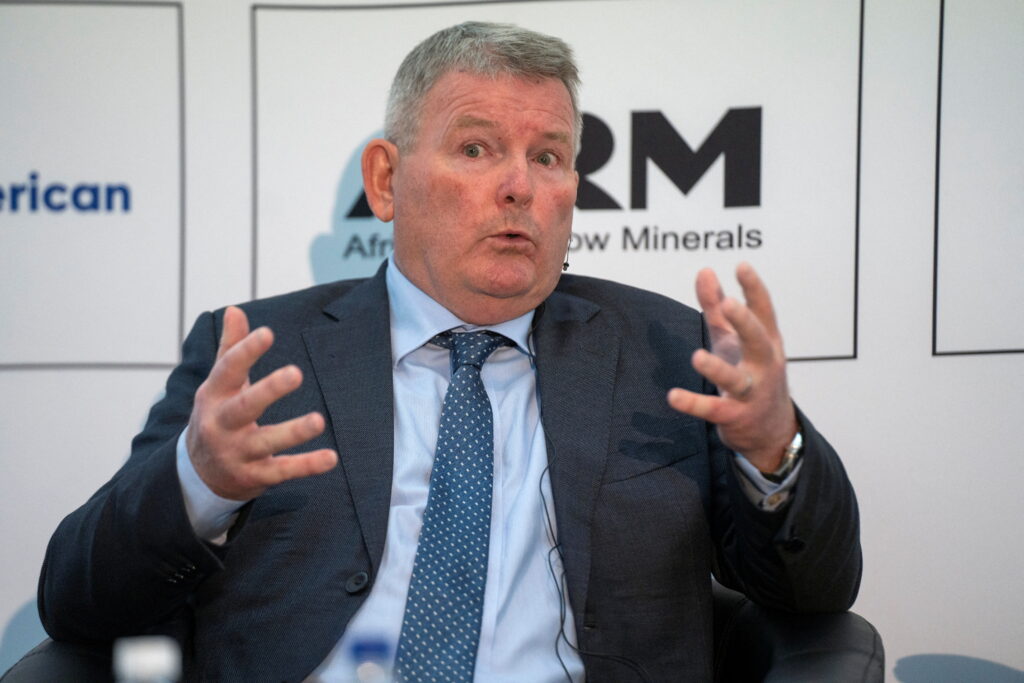
In the US, the second administration of President Donald Trump has been dismantling diversity, equity and inclusion policies in the federal government while taking a wrecking ball to environmental regulations and climate initiatives.
Against this political backdrop, there are signs of a growing investor backlash to ESG – environmental, social and governance concerns which have become a defining feature of corporate culture in recent years, notably in the mining sector.
In the first quarter of this year, according to data compiled by investment platform Morningstar, global sustainable open-end and exchange-traded funds experienced record outflows amounting to $8.6bn – a sharp reversal from the $18.1bn of inflows posted in the previous quarter.
“An increasingly complex geopolitical environment, including the return of Donald Trump to the White House, and new anti-ESG policy measures have prompted asset managers in the US, many with global operations, to adopt a more cautious stance,” Hortense Bioy, head of Sustainable Investing Research at Morningstar Sustainalytics, said in the report.
In the US, it was the 10th straight quarter of outflows on this front while Europe had its first quarter of net outflows since 2018.
The mining sector, because of its outsized impact on the environment and communities – and in places such as South Africa, a brutal history of exploitation under apartheid – has embraced the ESG zeitgeist with the fervour of a convert.
With the political leadership of the world’s largest economy now dismissing ESG and related trends as misguided obstacles to business and capitalism, how is the mining sector reacting?
According to the London-based International Council on Mining and Metals (ICMM), the ESG business case for the industry is set in stone.
“The commitment of ICMM members to responsible mineral production remains as strong as ever and will continue to progress. Every time we have made a commitment in the past regarding ESGs it’s been for sound business reasons. It’s not like it’s done for show or for the PR of it, it was done because it made sense for the business and in line with our commitment to being responsible operators,” ICMM CEO Rohitesh Dhawan told Miningmx in an interview.
“There would be no reason to roll that back now because of certain points of view that someone may have on the concept of ESG or sustainability because it doesn’t change the business imperative to do the right thing. That there is a certain political mind set in Washington doesn’t change the fundamental rationale for taking these steps because the steps are ways to make your business more resilient.”
As an example, Dhawan pointed to water usage.
“We’ve had pretty strong commitments on water reporting and management as the ICMM for many years now and some people might say that that is part of an ESG approach that needs to be questioned if you believe in the current US attitude. But why would you change your attitude to better water management?
“That’s a good thing for your business because it makes you more resilient, it’s a good thing for your relationship with communities, and it lowers your costs. Even if you took a purely financial view of many of these issues, you often come out on the side of responsible practice.”
Indeed, at least ICMM members and publicly listed mining companies generally are not showing any signs of cooling on ESG.
“When it comes to ESG and the South African mining sector, to a company they are all very good corporate citizens on the broad subject of ESG. We all produce separate sustainability reports these days and the volume of content and material is extensive. You should expect that to accelerate, not to slow down,” Paul Dunne, CEO of Northam Platinum who is also president of the Minerals Council South Africa, told Miningmx.
“Northam and my fellow companies in council have all got decarbonisation targets of various degrees. At Northam, ours is a 60% reduction in carbon intensity by 2030, which we now believe we will comfortably exceed and so we are looking for a new target above and beyond the 60%.”

This decarbonisation drive is rooted in factors that make business sense. Key markets such as the EU are beginning to impose penalties on imports with a heavy carbon footprint.
And in South Africa itself, the soaring cost of power provided by state-run utility Eskom – which still relies heavily on its ageing fleet of coal-fuelled plants – has sparked a scramble for renewable sources of energy.
Eskom has also been unreliable, though the rolling power cuts dubbed locally as “load shedding”, which reached their peak in 2023, have since been significantly curtailed. That may also speak to the fact that the economy is barely growing, with energy-intensive sectors such as mining and manufacturing showing a worrying trend of declining production over the long term.
COMMUNITIES, HEALTH, AND SAFETY
On the S part of the ESG concept, having good community and employee relationships also just makes business sense. Strikes and community protests that shut down production can hurt the bottom line while raising red flags for investors.
In South Africa, for example, the rise of the ESG ethos in the mining sector has coincided with a dramatic decline in labour militancy and community unrest as well as fatalities and injuries and cases of occupational disease such as silicosis.
A decade or so ago, South Africa’s mining industry was rocked by an outbreak of labour ructions that included the Marikana Massacre of August 2012 – when police shot dead 34 miners at Lonmin’s Marikana operation who were taking part in a violent wildcat stoppage – and a 2014 strike in the platinum sector that lasted five months.
In recent years by contrast, wage talks in the mining sector have often led to deals of up to five years that were inked without a single tool being downed.
Rising wages partly explain this turn of events. Wage agreements are almost inevitably linked to inflation plus a top-up, and over the past three decades, South African mineworkers have generally had a rising standard of living as a result.
This trend was firmly in place before ESG became a key and material metric in company reports, but its injection into the C-suite has surely retained the momentum.
Mine health and safety are also revealing in this regard.
In 2024, 42 miners were killed on the job in South Africa – a record low for a calendar year since the onset of industrial-scale mining in the late 19th century. Reported occupational diseases in the same year fell 17%.
The commitment of ICMM members to responsible mineral production remains as strong as ever and will continue to progress. Every time we have made a commitment in the past regarding ESGs it’s been for sound business reasons. It’s not like it’s done for show
Rohitesh Dhawan, ICMM
These developments, like rising wages, did not happen overnight. In the 1980s, as many as 800 South African miners were killed each year at work at a time when the apartheid-era C-suite had scant regard for African lives.
Years before ESG took hold, the health and safety record in South Africa’s deep and dangerous mines was steadily improving, driven by union demands and government regulation but also investor worries.
The ESG concept is not an epiphany that suddenly fell from the sky. It has been decades in the making, with measures and initiatives that are now classified as ESG already becoming entrenched.
This at the end of the day makes a business more sustainable and profitable. The Trump administration can try and buck the tide, but the laws of economic gravity are not easily defied.
Still, there are red flags raising alarms.
One was an executive order from the Trump administration on 10 February placing a moratorium on the enforcement of the Foreign Corrupt Practices Act (FCPA).
Introduced in 1977, the FCPA prohibits US individuals and companies – or those with a US connection such as a secondary listing – from bribing foreign public officials for commercial gain. It has long been seen as a vital tool to keep the corporate world in check.
Trump pointedly said it reduced the competitiveness of US companies, signalling that his administration was okay with corruption – a big blow to the G in ESG.
Global mining and trading giant and ICMM member Glencore in 2022 pleaded guilty and paid over $1.1bn in fines to resolve the US Department of Justice’s (DOJ) investigations into its violations of the act; malfeasance it described as “staggering”.
But in June, the Trump administration released its guidelines for FCPA enforcement and they affirm that the DOJ will continue probes and enforcement of the act. One big change is that it plans to target cartels under it, which should not impact the mining sector.

Troutman Pepper Locke, a leading international law firm, said in a commentary that the DOJ would also now “prioritise bribes that negatively impact US business opportunities abroad”.
It went on to say that in the wake of the June guidelines, companies should maintain robust anti-corruption compliance programmes: “Companies should continue to uphold strong anti-bribery and anti-corruption policies. These Guidelines communicate that the Trump Administration does intend to continue FCPA enforcement and investigations.”
The Trump administration may be driving some nails into the ESG coffin. But the ESG zeitgeist is hardly dead and buried, and responsible mining companies and organisations remain committed to its principles – not least because they are seen as a boost to the bottom line.



